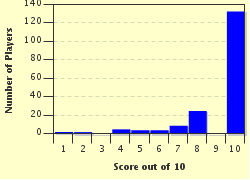
Farm Animals in Spanish, ¡Arriba! Quiz
Second in a series thanks to great response! Here are animals you might find on a farm. Match the English name with the Spanish name (in ALL CAPS). Then I'll be back to share some interesting word origins. ¡Buena suerte!
A matching quiz
by gracious1.
Estimated time: 3 mins.
- Home
- »
- Quizzes
- »
- World Trivia
- »
- Languages
- »
- Spanish
